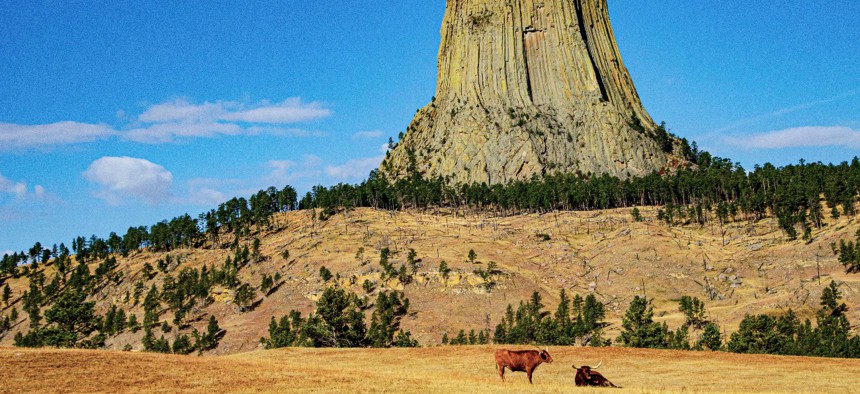
Education Images/Getty Images
The Success of Biden’s America the Beautiful Plan Hinges on Empowering Federal Employees
Rangeland destruction by cattle undermines conservation ambitions.
With lofty proclamations and admirable ambition, the Biden administration set its sights on preserving 30% of American lands and waters by 2030. In order to meet the goals of its America the Beautiful plan, which is part of the worldwide “30 by 30” conservation initiative, the administration must first empower federal employees to uphold existing environmental laws. Without adequate resources for federal land managers and strong leadership in federal land management agencies, visions of conserved landscapes will fail to meet the conditions on the ground.
The scope and challenges federal land management agencies face in upholding environmental standards are evident on rangelands managed by the Bureau of Land Management. The federal Bureau’s lands, predominantly in the Western United States, cover nearly 250 million acres or about 1/10 of all land in the United States. On vast swathes of that land — including rangeland that the Biden administration has proposed to count as conserved — grazing by domestic livestock is imperiling landscapes, waterways and the species that depend on them.
In the Western United States, more than 155 million acres of federal land are leased to private individuals and companies who pay below market rates to graze their herds on public land (or in the infamous case of the Bundys in Nevada refuse to pay and run off federal law enforcement at the end of a rifle scope). That land falls into three main categories: land that is meeting rangeland health standards (36%), land that has not yet been assessed (27%), and land that is failing to meet rangeland health standards (36%).
Livestock grazing is responsible for nearly three-quarters, or approximately 40 millions acres, of tracts that BLM assessed and categorized as failing to meet rangeland health standards, according to records obtained and analyzed by Public Employees for Environmental Responsibility. These records, obtained through Freedom of Information Act requests and made available to the public through an interactive map and database, must be taken into account as the federal government carries out its land conservation program. Grazing lands that fail to meet rangeland health standards should be consistently monitored and brought into compliance with environmental law in order to count among the 30% of lands the agency has set out to conserve.
Cattle grazing damages fragile landscapes, like the cold deserts of the interior West where most of the failing grazing allotments are, by stripping the land of already sparse vegetation. This leaves native species, like the imperiled sage grouse, with degraded habitat and edging further to the brink of extinction. Domestic herds also harm ecosystems by increasing erosion that rechannels rivers and increases sedimentation, which contributes to flooding and poor water quality in arid environments where every ounce of clean fresh water is vital. Overgrazing can promote the spread of invasive species like cheatgrass that drive ever-worsening rangeland wildfires. Clearly, this noxious cocktail of ecosystem degradation should not count as land that’s conserved habitat.
Turning around this slow moving ecological disaster requires strong leadership from President Biden and the heads of land management agencies as well as significant and durable investment in federal land management employees. Leaders such as Interior Department head Deb Haaland and Bureau of Land Management director Tracy Stone-Manning must create a culture of compliance with environmental laws. While federal land management agencies do and should work with local communities, they need to avoid cozying up to corporate ranchers and demand that ranchers comply with the conditions of their grazing permits.
But, strong leadership will do little good if land management agencies continue to operate with skeleton crews. Over the past two decades, there’s been major staff attrition at the BLM. From 2003 to 2020, the agency workforce has been reduced by nearly 2,000 full-time staff, or roughly 20%. Without boots on the ground, federal land managers cannot ensure lands are being conserved or work with grazers to get them to manage their herds responsibly. As staffing has decreased, federal land managers who should have monitoring staff and range riders surveying the land have been whittled down to the point where overburdened workers spend more time behind desks filing paperwork than out in the field stewarding the land. Rebuilding this workforce requires significant and stable investments by Congress in federal land management agencies.
As an organization that supports the federal employees charged with stewarding our precious natural resources, PEER applauds the Biden administration’s conservation goals. But, we remain wary of any conservation initiatives that don’t recognize the vital role federal employees play in responsible land management. The dream of conserving lands where biologic and human communities can thrive depends on the federal employees who carry out this work each day.
Chandra Rosenthal serves as the Rocky Mountain Office Director for Public Employees for Environmental Responsibility. PEER supports current and former public employees who seek a higher standard of environmental ethics and scientific integrity within their agencies. She is located in Denver, Colo.






